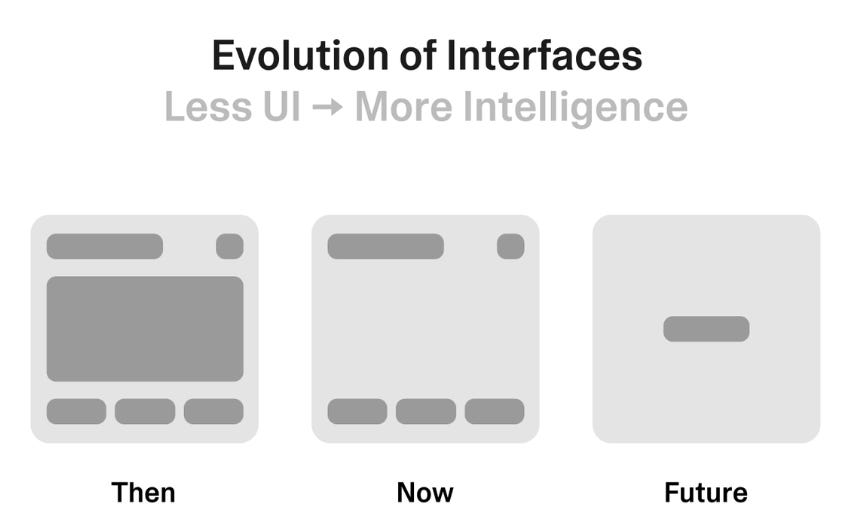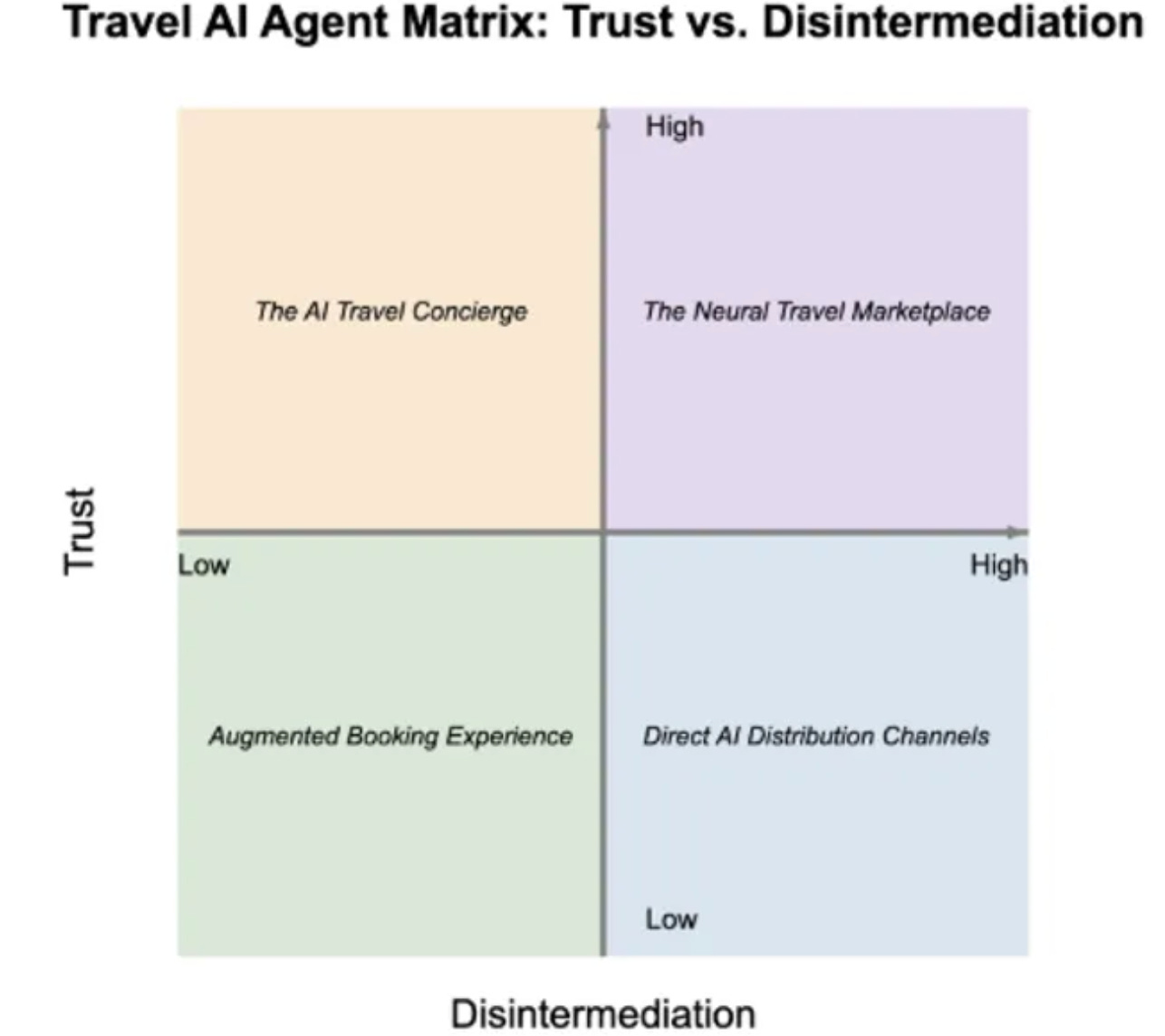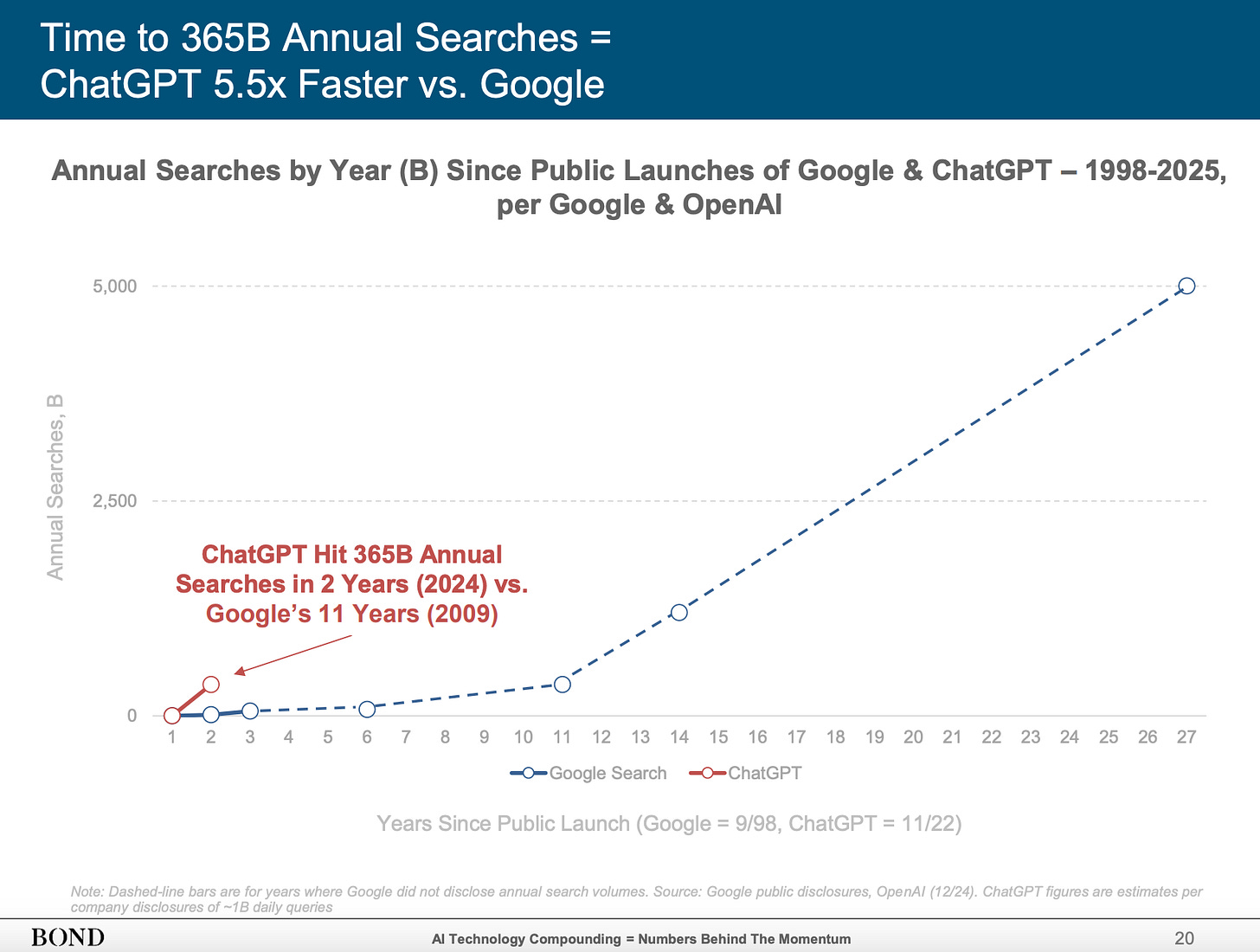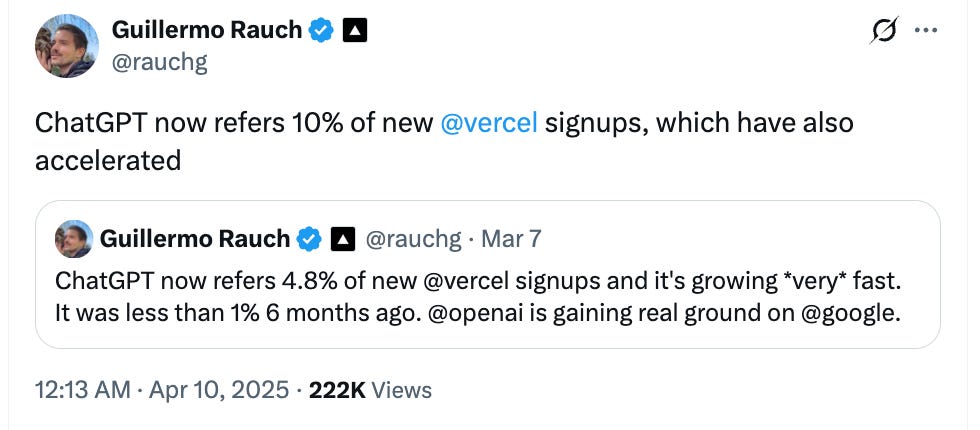The interface is changing rapidly. The screen is shrinking, chat is replacing search, and AI agents are starting to act on our behalf. For travel, this shift changes how decisions are made, how products are discovered and who controls the experience.
This is not only a redesign for current users. As 2.6 billion people are surfing the Internet for the first time through AI instead of browsers, they will jump directly to the proxy-first experience in their own language and background.
This question focuses on new developments. From environmental devices to agency shopping, from UI to next chapter in SEO. The interface is moving. Its landing will define the next generation of travel products.
Special thanks to Dune7 for sponsoring the Newsletter:
Dune7 teamed up with Skift Research to create a travel AI overview visibility index, providing unparalleled insights into how AIOS impacts brand performance and user engagement. Explore related Dune7 Blog:
– How AIO works
– Their impact on visibility of travel brands
– Websites that dominate AI overviewPlan a Free consultation Join our travel marketing experts to learn how to thrive in an AI-centric search landscape.
The most clicked link in the last issue is Google Kill CheckoutAbout how Google’s new “Shopping with AI Model” allows users to discover and purchase products directly from searches.
Mario Gavira (VP Global Growth and Branding on Kiwi.com) just published Four solutions for the future of travel agent AI There is a distinct framework for how AI agents reshape travel. He outlines four possible futures based on two variables: how much users trust their agents, and how direct bookings for those agents bypass OTAs.
This transformation is already happening. Since January, we have seen agency checkout via Google Pay, LLM-powered shopping assistants from Chatgpt and Clplexity, and a new interoperability standard (MCP) that plugs AI into almost any website.
this LinkedIn Debate What follows is worth reading. Most people agree that the interface is shifting and the struggle for distribution has just begun. Some people can see Google as a leader if it can move from search to proxy recommendations without losing user trust. Others think that the OTA will be displayed and cut out. Due to their infrastructure and size, some believe that OTA still has an advantage. Many see this moment as a real opportunity for new players built for the Agent Age.
Cute designer and angel investor Felix Hass thinks AI is shrinking the interface. Traditional applications are built around rigid flows because computers need help getting to know us. However, using AI, the assumption is reversed. If the system already knows our preferences, intentions, and constraints, there is no need for 10 screens.
Products optimized for traditional UI streams may be difficult to compete with the AI-NEATIANT experience. Multi-screen subscription streams may soon be outdated. Today’s smart design means asking: What is the most important element I really need? What can I reduce the minimum to?
We are moving from an app with 10 screens to one with one app. From chaotic interface to minimal triggers. The smarter the system, the less UI you need. Ultimately, the best UI may not be a UI at all. – Felix Haas
Jony Ive and Sam Altman cooperate ioThe purpose is to create a new device for how we interact with AI; not through search bars or applications, but through more environments, contexts and things integrated into daily life. This may fundamentally change where and how decisions happen.
This is important for travel, as most travel products today are still optimized for “legacy” platforms such as the Web and Mobile. These workflows depend on the user who initiated all operations. But, if io To succeed, we may be heading to a world rather than shaping decisions through clicks and faucets, but through an ever-present system of understanding intentions and taking corresponding actions.
This indicates significant changes in distribution, engagement and user behavior. When the Internet reshapes business, online companies win. The same pattern can be repeated. Today’s network and mobile phone players may struggle in the next interface. There is no reason to assume that the incumbent wins this time. History shows they won’t.
This may be the beginning of a new platform and the beginning of a new generation of companies and products.
“I feel more and more that everything I have learned over the past 30 years has brought me into this moment.” – Jony Ive, the legendary designer behind the iPhone, the iMac, and Apple’s most iconic hardware
Rex Woodbury Agent TradeAI can handle the future of regular purchases that are fast, practical and easy to delegate.
The difference between Utilities and Emotional Shopping is a useful lens for travel. Booking a last minute hotel at the airport may be a pure utility. Plan a milestone trip or choose a destination for the year to be more emotional. People want to explore, compare and feel inspired.
Rex’s view is that AI agents are well suited to deal with utility-oriented businesses with the goal of saving time. Emotional shopping, on the other hand, is more about discovery and contingency, which may resist full automation.
For a travel company, it means being clear about which part of the journey you are serving. If you are focusing on repeatable functional use cases, build for the proxy. If your goal is inspiration and exploration, build for humanity.
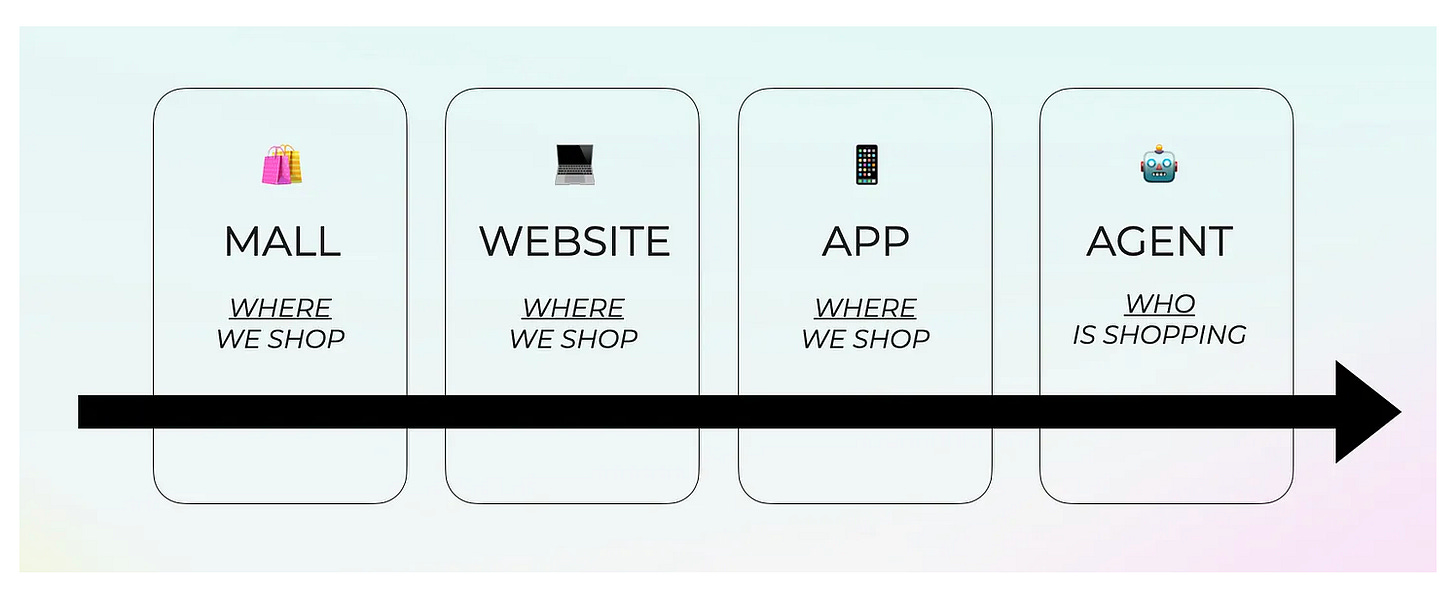
These charts illustrate a simple and powerful transition: trade has transitioned from offline to online over the past 25 years. The next 25 may be about from human-driven to proxy-driven.
The interface offsets we enter are not only from screen to voice, but also from form to chat. This is a transformation WHO This is being done. In many cases, software agents will shop, compare and decide on our behalf. For those utilities-oriented transactions, the winner will be a discoverable, trustworthy and easy to use (through machines).
Mary Meeker’s Internet Trends Report shaped a generation of technological thinking. She helped a generation of founders, operators and investors understand the shape of the future. Now she’s back with one AI-focused deck This is intensive, data-rich and widely shared. This is a comprehensive, 340-page overview of the current state of AI, covering topics such as user growth, user behavior, capital flows, platform dynamics, revenue models, and geopolitics.
Wander has just raised over $50 million in Series B funding, led by QED and the Fifth Wall. The company starts with vertically integrated models, buying luxury vacation homes and controlling the entire guest experience. When interest rates rose, Wander moved on, adopting an asset lamp, a software-powered model that now covers over 1,000 premium properties. Wander operates operations that allow them to fully manage third-party homes, while Wander Branded provides owners with access to their reservation engine and concierge tools. At the center is Wanderos, a proprietary stack that curates everything from guest newsletters to real estate inspections to supplier coordination without the need for local staff. The result is that GMV has increased 6 times in 18 months, NP is over 85, and the gross profit margin of hosted homes is 70%.
Some gains
-
The future of advanced stays may not be “more Airbnb”, but more carefully planned and advanced services
-
If the software can standardize quality, then owning inventory is not a prerequisite
-
Guests will reward consistency and service even at higher prices
Wander’s goal is to provide the best experience, not to be the largest platform. In the category where many tech players view operations as necessary evil, the focus becomes meaningful strategic advantage. Read + Boring
As the search moves to chat, the interface moves from the link to the answer. This changes the way discovery works, how trust is built, and how products grow. The game has changed: you are fighting for mentions, not rankings.
SEO has driven online growth over the past 20 years. Brands win by ranking top on Google. But in AI-driven interfaces, mechanics are different. This is not a feeding content engine; it is about the answer.
A16Z’s Zach Cohen and Seema Amble call this change Generate engine optimization (GEO), in their recent report How to rewrite search rules for engine optimization. GEO is a competition to enter the model. Timing is important. This shift has been long gone, but AD USD is moving very fast, especially when it comes to arbitrage. Google search drove growth in the 2000s. Facebook specifically defines the 2010s. In 2025, it is LLM and the platform to shape the memory, reference and surface of content.
In a world where AI is business and discovering front doors, the question for marketers is: Will the model remember you?
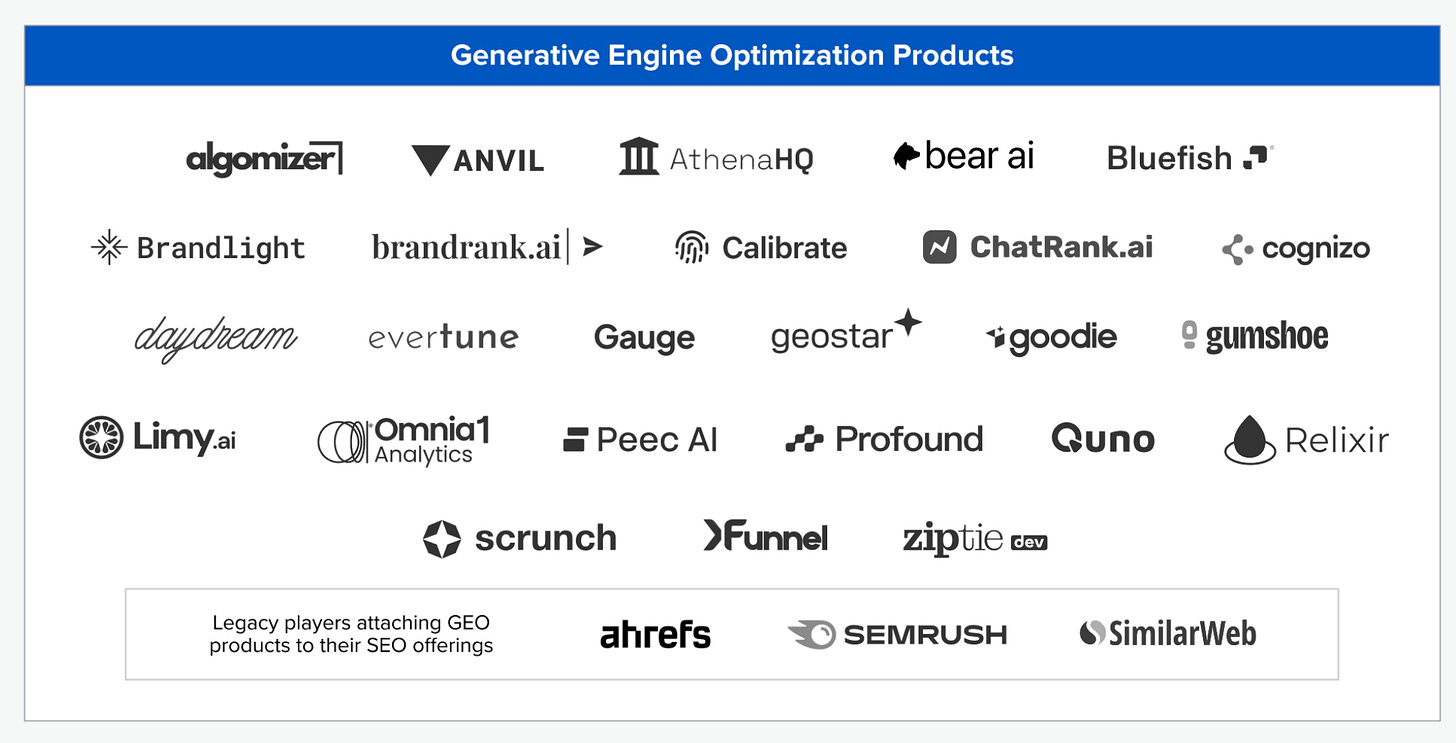
Vercel Power has over 4 million websites, including Walmart, Apple and Netflix. It is the preferred platform for modern web development and a good signal of developers’ behavior.
In September 2024, less than 1% of Vercel registrations were from Chatgpt. By March 2025, it is 4.8%. After a month, it doubled to 10%.
LLM is becoming a distribution channel and starting to do what Google search did in the 2000s.
30% (2.6 billion) of the global population has access to demand, controlling $120 billion in annual travel spending. However, 97% of travel content lacks verified accessibility information. Most OTAs offer filters that are virtually unverified. Hotels share the number of threads, but it is usually impossible to say whether wheelchair users can reach the bathroom sink.
Wheel World solves this problem not by repairing a hotel but by repairing information. They plotted over 4,000 properties of 80 destinations, with more than 200 validated data points in each list. This data powers the growing B2B and B2C flywheels.
I just published Go deep into the world. Despite poor service, this expenditure ($120 billion per year) is still happening. The real opportunity is much greater and will only develop with the age of the global population.
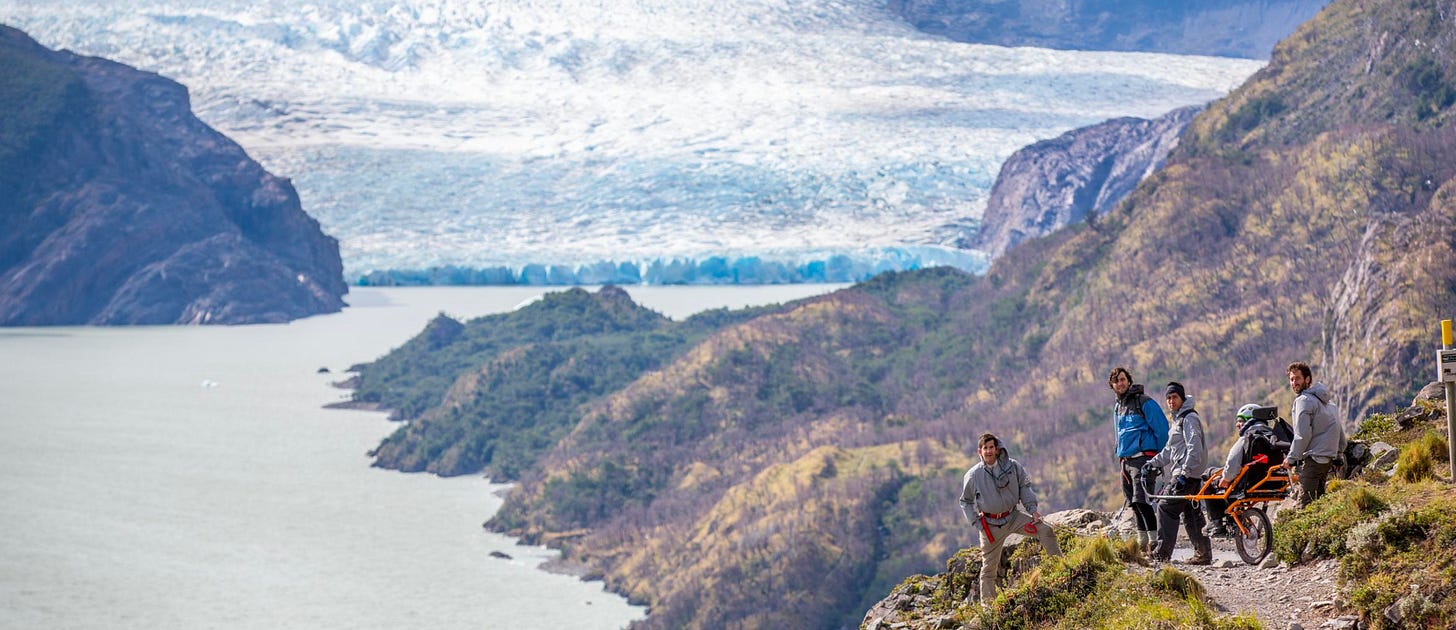
→ Explore all 1,339 open travel tech roles Travel Technology Essentialism Working Committee Now.
💼Employer: List your job openings here Complete this quick form
📩 For the latest roles, please subscribe Travel Technology Work Newsletter
If you are a startup looking to raise a round (from seed to series D), I can help (free). Travel Investor Network is a private platform where I recommend innovative travel startups to investors and innovators. If you are interested, please first Complete this form.
If you like travel tech essentialist, consider sharing with your friends or colleagues. If you have not subscribed yet, please join us:
And, as always, thank you for trusting my inbox.
Mauricio Prieto

